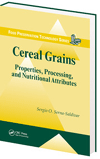Prebiotic Potential in Cereal
"Various mechanisms have been proposed, including prebiotic modulation of the colonic microbiota. In the present study, the prebiotic activity of a maize-derived WG cereal (WGM) was evaluated in a double-blind, placebo-controlled human feeding study (n = 32). For a period of 21 days, healthy men and women, mean age 32 (sd 8) years and BMI 23·3 (sd 0·58) kg/m2, consumed either 48g/d WG cereal (WGM) or 48g placebo cereal (non-whole grain (NWG)) in a crossover fashion. Fecal samples were collected at five points during the study on days 0, 21, 42, 63 and 84 (representing at baseline, after both treatments and both wash-out periods). Fecal bacteriology was assessed using fluorescence in situ hybridisation with 16S rRNA oligonucleotide probes specific for Bacteroides spp., Bifidobacterium spp., Clostridium histolyticum/perfringens subgroup, Lactobacillus-Enterococcus subgroup and total bacteria. After 21 days, consumption of WGM, mean group levels of fecal bifidobacteria increased significantly compared with the control cereal (P = 0·001). After a three-week wash-out period, bifidobacterial levels returned to pre-intervention levels. No statistically significant changes were observed in serum lipids, glucose or measures of fecal output," wrote A.L. Carvalho-Wells and colleagues, University of Reading.
The researchers concluded, "This WG maize-enriched breakfast cereal mediated a bifidogenic modulation of the gut microbiota, indicating a possible prebiotic mode of action."
Carvalho-Wells and colleagues published their study in The British Journal of Nutrition ("Determination of the in vivo Prebiotic Potential of a Maize-based Whole Grain Breakfast Cereal: A Human Feeding Study." The British Journal of Nutrition, 2010;104(9):1353-6).
Additional information can be obtained by contacting A.L. Carvalho-Wells, Nutrition Research Group, Dept. of Food and Nutritional Sciences, School of Chemistry, Food and Pharmacy, University of Reading, Reading RG6 6AP, U.K.
From the December 10, 2010, Prepared Foods' Daily News
Looking for a reprint of this article?
From high-res PDFs to custom plaques, order your copy today!





